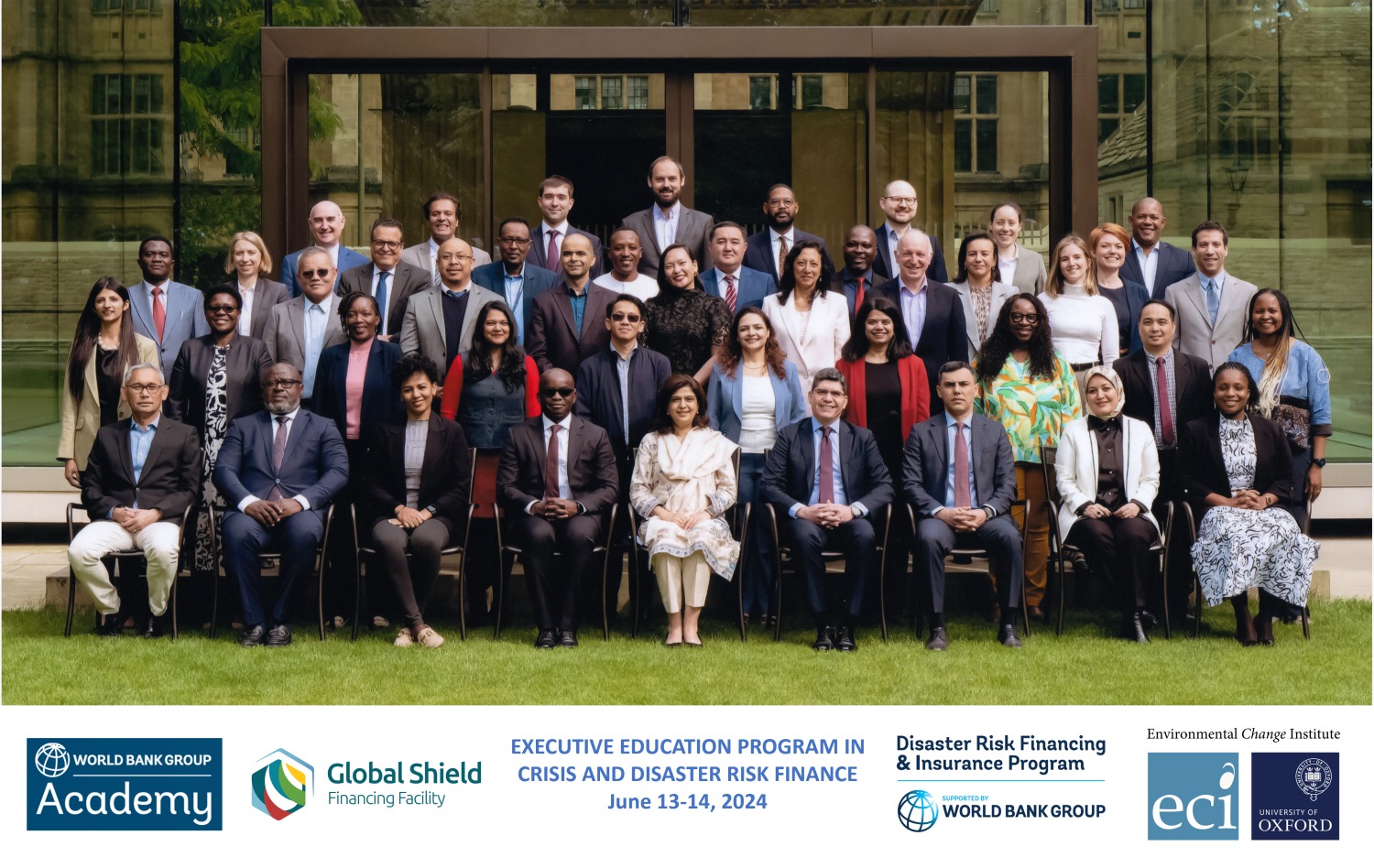[Event Recap] Oxford Executive Education Program on Climate and Disaster Risk Finance

The “Crisis and Disaster Risk Finance (CDRF) Executive Education Program” held on June 13-14, 2024 at Oxford University, UK was co-delivered with the University of in partnership with the Global Shield against Climate Risks and the Insurance Development Forum.
Objective of the Program
Governments around the world are seeking better understanding and better ways to manage the risks of weather-related disasters to prevent them from pulling people further into poverty and to limit the economic disruption in the aftermath.
Innovative financial solutions, such as risk pools and index insurance and financial instruments like the contingency funds, risk transfer etc. tailored to the unique contexts of developing countries, are emerging. These products are designed to provide rapid financing to those in need, offering a lifeline when it matters most. The intersection of policy, knowledge, and innovative financial products is crucial in building resilience against the increasing threat of natural disasters.
To meet this demand for knowledge, the Disaster Risk Finance and Insurance Program under the Prosperity VPU conducted a learning program as part of World Bank Academy. This course offered government officials real-world client experiences, market best practices and cutting-edge research from both public and private sector. The program which was attended by over 30 senior policy makers from 21 client countries (i.e. Sierra Leone, Peru, Indonesia, Laos PDR, Pakistan, Madagascar, Nepal, Somalia, Rwanda, Tunisia, Kyrgyz Republic, Morocco, Sao Tome and Principe, Philippines, Uganda, Uzbekistan, Angola, Tajikistan, Mozambique, Zambia, Malawi) tailored capacity building to operational and policy work of clients.
Day 1: Introduction and Deep Dive into CDRF Tools
The program commenced with opening remarks from Sir Charles Godfray (Director of the Oxford Martin School) and Pablo Saavedra (Vice President of Equitable Finance, WBG).
The session “Spotlight on DRF Thought Leaders” followed, with Encep Sundarwan (Director of Policy Formulation of State Asset, Ministry of Finance, Indonesia), Chris Adams (Professor of Development Economics, University of Oxford) and Sam Maimbo (Vice President of Budget Performance Review and Strategic Planning, WBG) delivering inspirational, Ted-style talks.
This “CDRF Impact Stories” session, coordinated and facilitated by Luis Alton (Senior Financial Sector Specialist, WBG), showcased the status of CDRF in various countries through concise 5-minute presentations. Delegates from Morocco, Uganda, Laos, Kyrgyz Republic, and the Philippines shared their unique experiences and provided a snapshot of CDRF practices and innovations in their respective countries. This session highlighted the diverse approaches and lessons learned from different regions, fostering a rich exchange of ideas and best practices.
The “Introduction to Financial Instruments” session involved an interactive World Café format, exploring instruments like Contingency Funds, Risk Transfer, and Contingent Credit, coordinated by Sumati Rajput (Senior Financial Sector Specialist, WBG) with insights from Michaela Dolk (Financial Sector Specialist, WBG), Luis, Evie Calcutt (Senior Financial Sector Specialist, WBG), and Olivier Mahul (Practice Manager, Crisis & Disaster Risk Finance Unit, WBG).
“Master the Disaster”, a simulation game on the fundamentals of disaster risk finance facilitated by Kaavya Ashok Krishna (Senior Financial Sector Specialist, WBG), offered simulated environment and experiential learning about financial planning in post-disaster scenarios.
The “CDRF Data and Analytics for Informed Policy Decisions” session saw Mark Bernhofen (Research Associate at the Oxford Sustainable Finance Group, Smith School of Enterprise and the Environment), Michaela, and Evie discuss the importance of data in shaping CDRF policies.
Day 2: Expanding the Scope of CDRF
The day started with a session on “Climate Change and the Greening of Financial Systems” delivered by Nicola Ranger (Director of the new Hub and Leader, Resilience and International Development at the Environmental Change Institute, University of Oxford). The session delved into recent developments in climate finance and its political economy.
“Collaboration with the Private Sector: Best Practices and Lessons Learned” featured Isa Ennadifi (Head of ESG and Sustainable Solutions – Alternative Risk Transfer line of business at Allianz Commercial) and Simon Young (Senior Director, Climate and Resilience Hub, Willis Towers Watson), who discussed catastrophe risk insurance markets bringing in the private sector perspective.
“Protecting Farmers Against Climate Shocks and Disasters”, presented by Evie and Luis, included a case study on India’s Pradhan Mantri Fasal Bima Yojana (PMFBY) crop insurance scheme.
Final session of the day “Mapping and Influencing Your Stakeholders” facilitated by Kaavya and Benedikt Lukas Signer (Advisor, Environmental Change Institute, University of Oxford) involved participants in exercises to develop strategies for effectively engaging with stakeholders.
The closing ceremony featured remarks from Nicola Ranger, Ekhosuehi (Secretary General, Insurance Development Forum), and Olivier, followed by a certificate presentation.
Conclusion
This two-day program provided a platform for a rich exchange of ideas and practical strategies in CDRF, emphasizing collaborative approaches and innovative solutions to build financial resilience against climate shocks. The blend of theoretical knowledge and practical applications provided participants with tools and strategies directly applicable to their respective countries and organizations.
Participant feedback underscored the training's efficacy, as 100% of the delegates found the training to be Excellent / Very Good and closely linked to their operations. All participants said they would recommend the program to their colleagues and requested for similar capacity building interventions in the future.
View the program resources, including agenda, presentations and photographs here.
To learn more about Disaster Risk Finance, please visit Financial Protection Forum.
Join the Disaster Risk Finance Community of Practice and the Disaster Risk Finance Community on LinkedIn.
For more information, please write to Sumati Rajput (srajput1@worldbank.org) or drfip@worldbankgroup.org